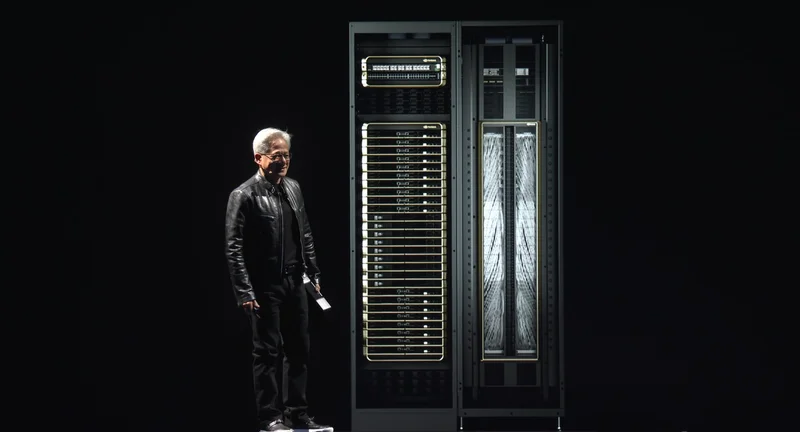So, Jensen Huang, the leather-jacketed CEO of Nvidia, finally said the quiet part out loud. He sat down for some glossy interview with Citadel Securities, probably in a room so cold you could hang meat in it, and admitted that U.S. export policies have cratered his company’s market share in China. The drop, as Jensen Huang says Nvidia went from 95% market share in China to 0% - Fortune, was from a cool 95% all the way down to a big, fat zero.
And he’s shocked. Shocked, I tell you.
He’s out here pleading for “nuance,” arguing it’s a “mistake” not to let Chinese researchers—half the world’s total, he claims—build their AI on American silicon. "I can’t imagine any policymaker thinking that that’s a good idea," he said.
Give me a break. This is a bad take. No, "bad" doesn't cover it—this is a five-alarm dumpster fire of a take from a guy who’s just mad his biggest cash cow got sent to the slaughterhouse by politicians. Did he honestly believe Washington would let its undisputed AI champion sell the shovels for a digital arms race to its number one global competitor forever? What planet are these guys living on?
This whole situation is like two parents going through the world’s ugliest divorce. The U.S. and China are screaming at each other, throwing plates, and changing the locks. And Nvidia? Nvidia is the kid stuck in the middle, crying because they can no longer sell their prized baseball cards to both Mom and Dad to fund their video game habit. The kid just wants the money to keep flowing, but the parents are too busy trying to burn each other’s houses down.
A Game of Geopolitical Chicken
Let’s be real for a second. Huang’s plea for "nuance" is just corporate-speak for "Please, for the love of God, let me get back to making obscene amounts of money from everyone." I get it. I really do. From a purely capitalist perspective, it makes perfect sense. China is the second-largest computer market on the planet. Walking away from that is like a brewery deciding to stop selling beer on weekends. It's corporate suicide.
But this stopped being about simple capitalism a long time ago. The moment the Biden administration dropped the hammer in 2022, restricting the most advanced chips, the game changed. This is about technological supremacy, national security, and a whole lot of political ego. Nvidia, bless their hearts, tried to play by the new rules. They designed a nerfed, export-compliant chip specifically for China. A "Diet Coke" version of their top-shelf stuff.

And what did China do? According to reports, they told their own tech giants not to even bother buying it. That’s the part of the story that gets conveniently glossed over. This isn't just the big, bad U.S. government bullying a poor, innocent corporation. China is actively playing this game, too. They’re flexing back, essentially saying, "If we can't have your best stuff, we don't want your scraps. We'll just build our own." And they will. All this policy has done is force-feed the Chinese tech sector a massive dose of steroids and a mandate to get self-sufficient, fast.
So who exactly is winning here? It sure as hell ain't Nvidia. And I’m not convinced it’s the U.S. either.
The Cycle of Stupidity
This isn't some new phenomenon. We've seen this movie before, and it always has a lousy ending. Remember back in April 2025 when the Trump administration first blocked some Nvidia sales? Then, just a few months later, they turned around and granted licenses in exchange for a 15% cut of the revenue. That wasn't a principled stand on national security; that was a mob-style shakedown. It set the precedent that this is all just a high-stakes negotiation.
And offcourse, China responded in kind, putting the squeeze on rare earth exports—the secret sauce in all our fancy gadgets. Then Trump hit back with 100% tariffs. It’s a never-ending cycle of tit-for-tat stupidity, and the only things getting bruised are the companies caught in the crossfire and, ultimately, us, the consumers who will pay for this mess.
Every time one of these D.C. suits gets on TV and talks about "strategic decoupling," I just want to scream. Most of these people probably think a semiconductor is the guy who leads the orchestra at the Kennedy Center. They're playing checkers with a geopolitical chessboard, and the consequences are very, very real. Jensen Huang has already written off China in his financial forecasts, calling any future business there a "bonus." A bonus! The second-largest market on Earth is now a rounding error on his balance sheet...
Then again, maybe I'm the one who's naive. Maybe this is just how the world works now. A slow, painful, and ridiculously expensive tearing apart of the global systems we spent decades building. It’s just exhausting to watch.
So We're Just Pretending This Ends Well?
Look, I’m no fan of the CCP, but this strategy is monumentally shortsighted. By cutting China off, we’ve created a cornered animal with a massive budget and a national imperative to out-innovate us. We’ve traded a customer for a state-funded, hyper-motivated competitor. In a few years, when Huawei or some other company we’ve never heard of unveils an AI chip that rivals Nvidia’s, all the politicians who championed these restrictions will be long gone, probably sitting on the boards of the very defense contractors who profited from this new cold war. Jensen Huang is right to be worried, but he’s worried about the wrong thing. The problem isn’t that he lost 95% of his market share; the problem is that the geniuses in charge have no idea what comes next.
